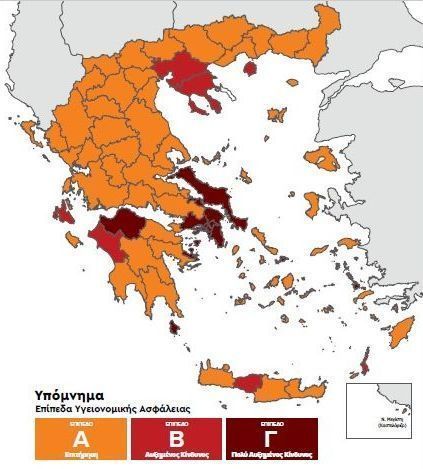Greece Adds ‘Dark Red’ Level to Covid-19 Risk Map
Greek authorities have added ‘dark red’ to the country’s color-coded risk-assessment map that enables citizens to track the spread of the coronavirus (Covid-19) in the country and keep up to date with the latest safety restrictions in areas.
The color ‘dark red’ indicates the areas in Greece that are considered “very high-risk” due to increased Covid-19 cases. Residents in “dark red” areas are obliged to follow stricter lockdown measures that include an evening/night curfew from 6 pm to 5am.
Moreover, all schools will be closed (students will follow lessons remotely via tele-education) and retail stores and hairdressers will be shut.
Greece’s Covid-19 alert system for all the country’s regional units now depends on the degree of risk that is indicated by three color-coded levels (from two color-coded levels previously):
Level A – Areas under monitoring – Color: ORANGE (previous yellow areas)
Level B – High-risk areas – Color: RED
Level C – Very high-risk areas – Color: DARK RED
Kalymnos, Evosmos-Kordelio become ‘very high-risk areas’
During Friday’s Covid-19 media briefing, Greek Deputy Civil Protection Minister Nikos Hardalias announced that the island of Kalymnos and the Municipality of Kordelios-Evosmos (Thessaloniki regional unit) will both enter a strict lockdown as of Saturday, February 20, as they have moved to ‘dark red’ status (Level C) due to an increase in Covid-19 cases.
Other areas in Greece that are currently in “dark red” status and under strict lockdown include the regional unit of Achaia (northwestern Peloponnese), the regional unit of Evia (not Skyros island), the island of Mykonos and the Region of Attica.
‘High-risk areas’
Hardalias also announced which areas have moved to Level B (red-high-risk areas) on the map: Kefalonia, Thassos, the regional unit of Ilia (except Andritsaina), the Municipality of Agia (Larissa), Heraklion (Crete), Corinth, Nemea, the Municipality of Argos-Mykines (Argolis, Peloponnese) and the Municipality of Zitsa (Ioannina).
Other “red” areas are: Thessaloniki, Halkidiki and Rethymno.
‘Orange’ areas (former ‘yellow’ areas)
The deputy minister did come with some good news, as he announced that the following areas in Greece are now at Level A (orange) and will see eased restrictions: Municipality of Thira (Santorini), Municipality of Agios Nikolaos (Crete), Zakynthos, Municipality of Sparti (Lakonia) and Municipality of Eordaia (Kozani).
The eased restrictions for “orange” areas are the measures that had been announced for the former “yellow” areas and can be found here. Among other things, the restrictions in “orange” areas include the night curfew returning to 9pm to 5am.
It is noted that the common measures in force for citizens in areas of all three color-coded levels include: mask wearing is mandatory in all indoor and outdoor public spaces, outside movement is allowed only for six specific reasons and by sending an SMS to the five-digit mobile phone service 13033 and movement between Greek prefectures (domestic travel) continues to be banned (except for health and work reasons).
Greek health authorities on Friday announced 1,460 new coronavirus cases and 28 deaths. Since the start of the pandemic, the total number of cases in the country has reached 177,494. The Covid-19 death toll in Greece is 6,249.
Greece’s coronavirus risk-assessment map can be seen here as provided by the General Secretariat for Civil Protection. The map is revised every Wednesday.
Further information (in Greek) on the restrictive measures in ‘orange’, ‘red’ and ‘dark red’ areas, press here.










Is there any indications of when activities like fishing and hunting in “orange” zones will be allowed again?